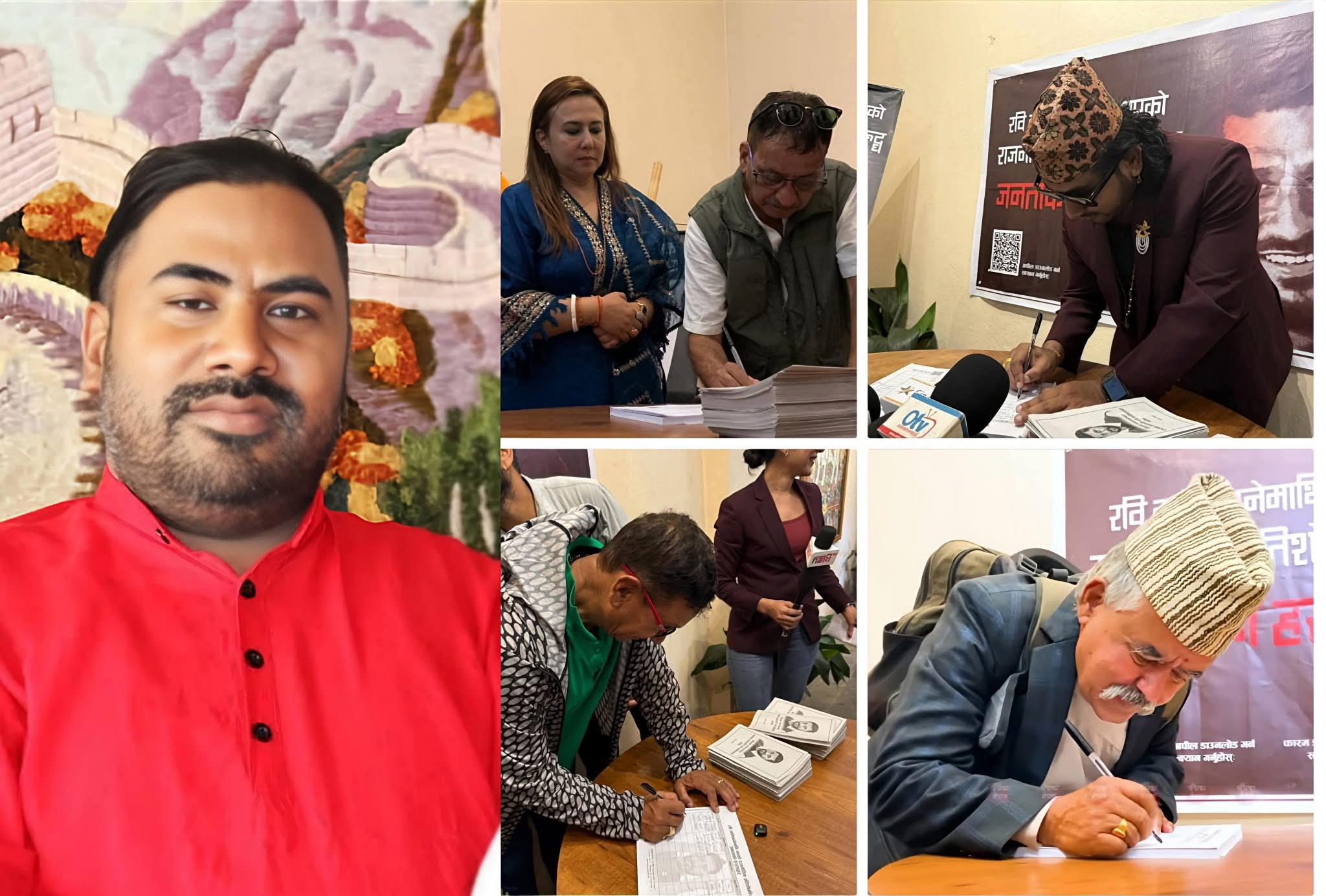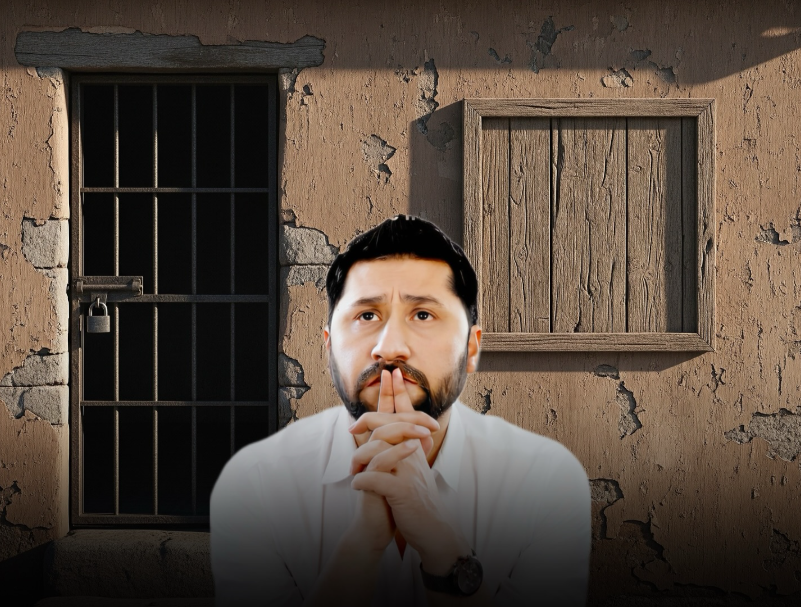A storm is brewing in Nepal’s legal and political circles. Artists who joined a campaign supporting Rabi Lamichhane, the embattled leader of the Rastriya Swatantra Party (RSP), now face a serious threat. Yubaraj Safal, a prominent figure, has warned of filing contempt of court charges against these artists, accusing them of undermining the judiciary. The “Signature Against State’s Revenge and Injustice” campaign has sparked heated debate, with Safal claiming it interferes with Nepal’s legal process.
Rabi Lamichhane, the charismatic yet controversial RSP president, is currently in custody, facing allegations of cooperative fraud and organized crime. The charges stem from his alleged role in diverting millions of rupees from cooperatives, including Sano Paila Cooperative, to Gorkha Media Network, where he served as managing director. The Signature Against State’s Revenge and Injustice campaign, launched by RSP on June 21, 2025, claims Lamichhane’s detention is a political conspiracy to silence a rising political force. Artists who signed this campaign, believing it supports justice, now find themselves in the crosshairs of Safal’s legal warning.
Safal’s threat hinges on the idea that the artists’ involvement could be seen as an attempt to pressure the judiciary. He argues that publicly supporting a sub judice case—meaning one still under judicial review—crosses a dangerous line. By signing the campaign, artists are allegedly sending a message that the Nepal judiciary is unfair, which Safal says undermines its independence. Legal experts, like advocate Yagyamai Neupane, disagree, stating the campaign is a form of free expression and does not directly influence court decisions. The clash between free speech and judicial integrity has ignited a fierce debate in Nepal.
The Signature Against State’s Revenge and Injustice campaign has gained traction, with supporters, including former Prime Minister Baburam Bhattarai, rallying behind Lamichhane. Launched on RSP’s third anniversary, it has collected signatures both in Nepal and internationally, framing Lamichhane’s legal troubles as political revenge. Bhattarai, visiting RSP’s office on June 28, 2025, called the detention unfair, fueling the narrative that Lamichhane is a victim of a corrupt system. However, Safal insists that such campaigns, especially when backed by high-profile figures like artists, risk tarnishing the judiciary’s reputation and interfering with legal proceedings.
Lamichhane’s case is complex, involving multiple cooperatives across five districts. The Parsa District Attorney’s Office filed a charge-sheet on June 13, 2025, accusing him and 28 others of embezzling over Rs 115 million from Sano Paila Cooperative. Evidence suggests Lamichhane, as a cooperative member, took a Rs 15 million loan and played a key role in transferring funds to Gorkha Media. The Supreme Court, on May 23, 2025, upheld his detention, citing his active participation in financial transactions. Safal’s warning to artists stems from this high-stakes case, as he believes public campaigns could sway perceptions of the ongoing trial.
Artists, known for their influence in shaping public opinion, have added fuel to the controversy by joining the campaign. Their signatures are seen by some as a bold stand against perceived injustice, but Safal views them as a direct challenge to the court’s authority. He argues that their involvement amplifies the campaign’s reach, potentially pressuring judges and eroding public trust in the legal system. The artists, however, may see themselves as defending free speech and supporting a leader they believe is unfairly targeted. This tension highlights the delicate balance between public expression and respecting judicial processes in Nepal.
The RSP has defended the campaign, with members like Neupane arguing it does not target court decisions but rather exposes a broader political agenda. Lamichhane himself, in a statement from Bhairahawa prison on June 21, 2025, claimed he is paying the price for challenging Nepal’s entrenched political system. He alleged that after refusing an offer to become Prime Minister, he was branded a fraud. Such claims resonate with his supporters, including the artists, who see the campaign as a fight against state oppression. Yet, Safal’s threat of contempt charges underscores the risk of crossing legal boundaries in such a sensitive case.
Nepal’s judiciary is now under scrutiny, caught between public campaigns and its duty to remain impartial. Safal’s warning raises questions about where to draw the line between activism and interference. While the artists may argue they are exercising their right to free speech, Safal insists that their actions could be interpreted as contempt under Nepal’s legal framework. The Contempt of Court Act allows for penalties if actions are deemed to obstruct justice, and Safal believes the campaign’s narrative directly challenges the judiciary’s credibility.
The case also sheds light on Nepal’s broader political landscape. Lamichhane, a former media personality turned politician, has positioned himself as an outsider fighting a corrupt establishment. His party, RSP, has gained popularity for its anti-establishment stance, making his detention a rallying point for supporters. The artists’ involvement in the campaign amplifies this narrative, but it also risks escalating tensions with the judiciary. As Safal prepares to take legal action, the artists face a choice: stand by their support for Lamichhane or risk facing contempt charges that could have serious consequences.
The controversy is far from over, with the next court hearings likely to draw even more attention. The Supreme Court and lower courts are navigating a delicate situation, balancing evidence against Lamichhane with the public’s right to protest. For now, the artists’ signatures have placed them at the center of a legal and political firestorm. Whether their actions will be deemed contempt or a legitimate expression of dissent remains to be seen, but the debate has exposed deep divisions in Nepal’s political and judicial systems. The outcome of this clash could set a precedent for how public campaigns intersect with ongoing legal cases in the country.









